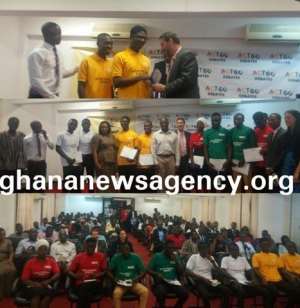
The University of Ghana has won an Inter-tertiary School debate on national anti-corruption and transparency campaign held among four universities.
The Central University emerged as the first runner-up in the debate, which formed part of the national anti-corruption and transparency week, while the Islamic University and the Accra Technical University, tied up as second runner-ups.
It was organised by the Institute of Economic Affairs (IEA) and the United States Embassy in Ghana on the theme: 'Empowering the Youth in the Fight Against Corruption'.
The debate was on the motion: 'Which of these will you prioritise and why: A Special Prosecutor or Right to Information Law,' and was ostensibly an opportunity to the youth to contribute towards the anti-corruption campaign.
The four Tertiary Institutions advanced their claims and supported their stance with the aim of convincing the judges to align with them, through eloquence and exhibition of research carried out by the speakers.
Mr Gerald Arhin, the principal speaker for UG spoke in favour of the Right to Information Law and among other points claimed that the bill, when passed into law would empower the entire citizenry to make their piecemeal contribution in the fight against corruption.
He said he was passionate about the fight, because if the country was entirely corrupt it would undermine development and impoverish the people.
'It is against this background that I had to spend a lot of time to research on the topic and contribute to curb corruption.
'We are writing examinations, but curbing corruption is a priority to me because as a Political Science student, if I become a politician and corruption damages the system, it will not augur well for me,' Mr Arhin added.
Professor John Asafu-Adjaye, a Senior Research Fellow with the IEA noted that the full scale of corruption was not known saying, the figures parading could be an underestimation of the reality on the grounds.
He said there was the need to rally the youth towards the fight against corruption in Ghana and Africa at large adding that the rate of corruption, if not curbed could reduce economic status of the country.
He said, research by the Transparency International on Ghana noted that the level of corruption from 2012 to 2016 had worsened in the country and said perception of corruption and actual corruption acts had increased because of investigations carried out by Journalists such as; Anas Aremeyaw Anas and Manasseh Azure Awuni among others.
Prof. Asafu-Adjaye said corruption had heinous socio-economic implication on the economy as investors would not trust the system to invest in the economy.
He was however optimistic that the debate had achieved its aim of reaching the youth in their numbers, making them understand and appreciate the roles they could play towards curbing the canker of corruption in the economy.
He added that IEA believed that the message of anti-corruption that was shared among the youth at the occasion would trickle down to the participants and peers and urged the youth to take interest in the fight against corruption by reading about the Special Prosecutor and the Right to Information bills to keep them informed and transfer the knowledge gained.
GNA
By Julius K. Satsi, GNA




 Lay KPMG audit report on SML-GRA contract before Parliament – Isaac Adongo tells...
Lay KPMG audit report on SML-GRA contract before Parliament – Isaac Adongo tells...
 Supervisor remanded for stabbing businessman with broken bottle and screwdriver
Supervisor remanded for stabbing businessman with broken bottle and screwdriver
 NDC watching EC and NPP closely on Returning Officer recruitment — Omane Boamah
NDC watching EC and NPP closely on Returning Officer recruitment — Omane Boamah
 Your decision to contest for president again is pathetic – Annoh-Dompreh blasts ...
Your decision to contest for president again is pathetic – Annoh-Dompreh blasts ...
 Election 2024: Security agencies ready to keep peace and secure the country — IG...
Election 2024: Security agencies ready to keep peace and secure the country — IG...
 People no longer place value in public basic schools; new uniforms, painting wil...
People no longer place value in public basic schools; new uniforms, painting wil...
 'Comedian' Paul Adom Otchere needs help – Sulemana Braimah
'Comedian' Paul Adom Otchere needs help – Sulemana Braimah
 Ejisu by-election: Only 33% of voters can be swayed by inducement — Global InfoA...
Ejisu by-election: Only 33% of voters can be swayed by inducement — Global InfoA...
 Minority will expose the beneficial owners of SML, recover funds paid to company...
Minority will expose the beneficial owners of SML, recover funds paid to company...
 Prof. Opoku-Agyemang has ‘decapitated’ the NPP’s strategies; don’t take them ser...
Prof. Opoku-Agyemang has ‘decapitated’ the NPP’s strategies; don’t take them ser...
